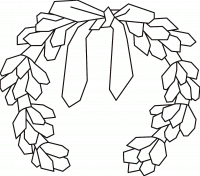
Spring 2022
(Jump to Fall 2021 or Summer 2021)
Primarily for Undergraduates
ARCH 0156 Architecture and Urbanism of Africa (HIAA 0770) [CRN: 26203]
Interested students must register for HIAA 0770.
This course introduces African built environments from the earliest known examples to the contemporary moment. Through recent debates about heritage and preservation, we will interrogate “Africa” as both an imagined construct and a concrete geographic entity characterized by diverse cultures, contexts, and histories. We will also explore competing interpretations of Africa’s architectural and urban history and their contemporary relevance. Weekly one-hour section required. A. Instructor: Itohan Osayimwese. TTh 10:30am-11:50am.
ARCH 0255 Monsters [CRN: 27270] [Course Website]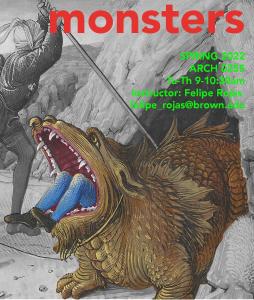
This course probes the origins and histories of creatures such as dragons, centaurs, griffins, sirens, and werewolves, using textual and material evidence drawn primarily from the ancient Mediterranean and Near East. We survey the cultural domains in which these and similar monstrous creatures held sway and reflect about their impact on ancient (and modern) ideas about “nature”, “race”, “gender”, “identity”, and what it means to be “human”. DIAP. FYS. Instructor: Felipe Rojas. TTh 9am-10:20am.
ARCH 0520 Roman Archaeology and Art [CRN: 24696] [Course Website]
Anyone who has ever watched “Gladiator”, “Spartacus”, “Life of Brian”, or “Bugs Bunny: Roman Legion Hare” has some image of Rome, the Romans and their empire. This course, while exploring and assessing these influential popular preconceptions, introduces a more balanced view of Roman archaeology and art, examining not only the “eternal city” of Rome, but its vast and diverse imperial domain. Instructor: Candace Rice. MWF 11am-11:50am.
ARCH 0529 Swords, Sandals, and Saunas: The Roman Army in War and Peace [CRN: 27215] [Course Website]
The Roman legionary is often seen as synonymous with the power of the Roman Empire: heavily armored, spear and shield in hand, marching unrelentingly forward against enemies. But the military was more than a menacing State institution, and this class shifts the focus to the lives of the men who filled the ranks, exploring their languages, religions, clothing, equipment, and fighting styles. We will draw upon evidence of all sorts, including archaeological material from fortifications and battlefields, inscriptions on tombstones and other monuments, and iconographic depictions. Instructor: Tyler Franconi. MWF 2pm-2:50pm.
ARCH 0537 Making and Unmaking the World: Ancient Empires and Their Aftermath [CRN: 27271] [Course Website]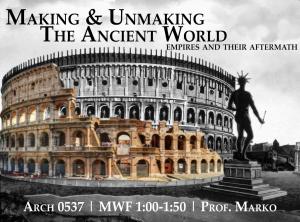
The Romans built a world of their own: they constructed infrastructure that spanned the empire, built cities, roads, aqueducts, and monuments, and even reshaped the natural environment itself -- often at great cost. By looking at the impact of such imperial projects on the built environment and the natural world, this course highlights the costs of building ancient civilizations and the aftermaths they left behind. We will learn about how these features were built, what they became after the empire’s fall, and how they changed the world for better… or worse. Instructor: Alex Marko. MWF 1pm-1:50pm.
For Undergraduates and Graduates
ARCH 1152 Bandits and Barbarians: Exploring Subaltern Resilience and State Power (ANTH 1145) [CRN: 26080] [Course Website]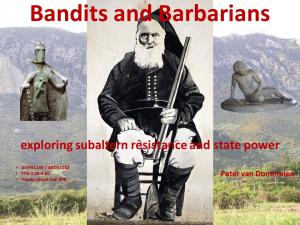
Interested students must register for ANTH 1145.
In the imaginations of ancient Greeks and Romans, the urban centers of ‘civilization’ were surrounded by wild lands where barbarians roamed. Even now, mountains, marshes, forests, and deserts are the realms of bandits, primitive tribes, warlords, and terrorists. From ‘shepherd-bandits’ in highland Sardinia and ‘red-faced Gauls’ in Roman France to ‘marginal tribes’ in the Kabyle mountains and the ‘wild people’ of the Ethiopian borderlands, this course explores peripheral lands through time and across the globe. We will critically examine such stereotypical representations, to understand how their inhabitants carved out their own spaces in the interstices of ancient and modern states. Instructor: Peter van Dommelen. TTh 2:30pm-3:50pm.
ARCH 1170 Community Archaeology in Providence and Beyond [CRN: 25763] [Course Website]
Modern archaeology is about far more than just digging in the dirt. During this seminar, we will discuss how archaeologists can engage with the public—including collaborations with indigenous and local communities, increased multivocality in interpretations, the mass media, museums, educational outreach programs, and the use and abuse of the past by governments and others in power. The second half of this course will involve a hands-on project in the Providence public school system. Enrollment limited to 15. Instructor: Miriam Rothenberg. T 4pm-6:30pm.
ARCH 1211 The Body in Medieval Art (HIAA 1440E) [CRN: 26314]
Interested students must register for HIAA 1440E.
The seminar considers the contradictory aspects of embodiment in the visual and material culture of the Middle Ages. We will examine the veneration of holy bodies through living holy individuals, and through body parts (relics) and the Eucharist enshrined in sumptuous containers. We will look at the iconography of death and resurrection, the representation of the body in painting and sculpture, attitudes toward sexuality, the performance of identity through clothing, and the sumptuary laws that governed clothing and behavior. We will investigate funerary rituals and burial, and the movement of living bodies in dance and in civic and religious processions. Enrollment limited to 25. Instructor: Sheila Bonde. M 3pm-5:30pm.
ARCH 1305 Myth and Narrative in Greek Art [CRN: 27272] [Course Website]
From Homeric epics to Athenian tragedies, masterpieces of mythological narrative form the backbone of Greek literature. But myth and storytelling were also powerful forces in Greek art—from vase painting to monumental sculpture. This class asks how myth in art responded to social realities or political developments, and what was the role or agency of the artist as a creator of content? How did myths evolve over time or take on new meanings in different contexts? Our class will look at many mythological stories in art and learn to “read” Greek visual narrative within its artistic, social, economic, and political setting. Instructor: Cicek Beeby. TTh 10:30am-11:50am.
ARCH 1439 Jerusalem Divided: Politics and Cultural Heritage (URBN 1870K) [CRN: 25631]
Interested students must register for URBN 1870K.
“The heritage of Jerusalem is indivisible, and each of its communities has a right to the explicit recognition of their history and relationship with the city. To deny, conceal or erase any of the Jewish, Christian, or Muslim traditions, undermines the integrity of the site, and runs counter to the reasons that justified its inscription on the UNESCO World Heritage list.” These are the words of Irina Bokova, former Director-General of UNESCO, spoken in 2016. While the indivisible heritage referred to in this context reflects the reality of Jerusalem’s Old City’s intertwined historical, cultural, and religious legacies, it does not address the geopolitical conflict, in which ideological and territorial claims produce diverging heritage narratives. In this seminar, we will examine how competing heritage narratives have been shaped by Israeli, Palestinian, and international views and interests. We will explore the history of archaeological exploration, discovery, and interpretation in Jerusalem in the contexts of social, political, and religious debates from the mid-nineteenth century to the present, with an emphasis on its urban landscape. Instructor: Katarina Galor. W 3pm-5:30pm.
ARCH 1538 Heritage Under Fire: From Conflict to Understanding, Memory, and Reconciliation [CRN: 27150] [Course Website]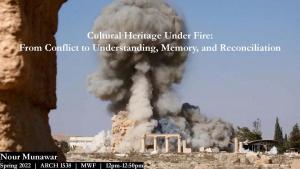
This course examines the intricate relationships among the past, politics, and contemporary archaeology in conflict zones, particularly in the Middle East and North Africa regions. Discussions will include the political and moral agendas entangled in cultural heritage advocacy, the biases inherent in interpreting cultural heritage, and the use of history and archaeological evidence to legitimize societal divisions, as well as how factors such as colonialism, nationalism, terrorism, and armed conflicts impact heritage. How can archaeology contribute to fostering reconciliation and healing? MWF 12pm-12:50pm. Instructor: Nour Munawar.
ARCH 1635 The Great Heresy: Egypt in the Amarna Age [CRN: 24698] [Course Website]
At the height of Egypt’s power in the New Kingdom, King Amenhotep IV initiated a religious revolution that affected all aspects of Egyptian high culture. Declaring the sun-disc, Aten, to be the sole god, this king changed his name to Akhenaten and moved the capital city to a new site at Amarna. Along with this move came massive shifts in everything from temple worship to art, international relations to funerary religion. This course will set the Amarna period in its context, examining remains from the reign before Akhenaten to the restoration of traditional Egyptian religion under his immediate successors, including King Tutankhamun. Instructor: Laurel Bestock. TTh 1pm-2:20pm.
ARCH 1703A Water and Architecture (HIAA 1101C) [CRN: 26315]
Interested students must register for HIAA 1101C.
The seminar explores the varied ways in which water is manipulated in architecture and urban planning. It is organized in ‘archaeological’ order: from the most recent to the oldest. We will examine case studies, beginning with Tadao Ando’s Water Temple and Frank Lloyd Wright’s Fallingwater. We will examine the local examples of Slater Mill, the Blackstone River, and Barnaby Evans’ Waterfire. We will then look back at historical examples: the Hoover Dam, the creation of Venice and the Grand Canal of China, the fountains at Versailles, the Islamic gardens at Isfahan, the medieval hydraulic plan for Canterbury Cathedral, and the Roman aqueduct bridge of the Pont du Gard. One of the principal aims of the course is to place the discussion of design into historical, technological and environmental contexts, and to provide students with experience in the production of architectural projects. FYS. Instructor: Sheila Bonde. Th 4pm-6:30pm.
ARCH 1765 Pandemics, Pathogens, and Plagues in the Greek and Roman Worlds [CRN: 25761] [Course Website]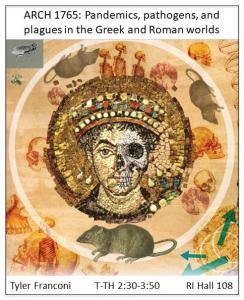
Terror of mass illness is nothing new; as long as there have been humans, there has been disease. These pandemics and plagues have had mortal impacts on past societies, much as contemporary plagues affect today’s economies, social and political structures, and populations. This class considers disease and society in the ancient Greek and Roman worlds, beginning with the Plague of Athens in 430 BC and continuing to the outbreak of the ‘first pandemic’ of bubonic plague in AD 541. We will examine these case studies through archaeological material, written accounts, DNA analysis, palaeoclimate reconstruction, and palaeopathology. Instructor: Tyler Franconi. TTh 10:30am-11:50am.
ARCH 1771 Archaeology of Death (ANTH 1623) [CRN: 24954]
Interested students must register for ANTH 1623.
Examines death, burial, and memorials using comparative archaeological evidence from prehistory and historical periods. The course asks: What insight does burial give us about the human condition? How do human remains illuminate the lives of people in the past? What can mortuary artifacts tell us about personal identities and social relations? What do gravestones and monuments reveal about beliefs and emotions? Current cultural and legal challenges to the excavation and study of the dead are also considered. Instructor: Patricia Rubertone. MWF 10am-10:50am.
ARCH 1772 The Human Skeleton (ANTH 1720) [CRN: 25586]
Interested students must register for ANTH 1720.
More than simply a tissue within our bodies, the human skeleton is gateway into narratives of the past--from the evolution of our species to the biography of individual past lives. Through lecture and hands-on laboratory, students will learn the complete anatomy of the human skeleton, with an emphasis on the human skeleton in functional and evolutionary perspective. We will also explore forensic and bioarchaeological approaches to the skeleton. By the course conclusion, students will be able to conduct basic skeletal analysis and will be prepared for more advanced studies of the skeleton from medical, forensic, archaeological, and evolutionary perspectives. Enrollment limited to 20. Not open to first year students. Instructor permission required. Instructor: TBD. MWF 10am-10:50am.
ARCH 1781 Violence: A Brief History (HIST 1700) [CRN: 25051]
Interested students must register for HIST 1700.
Violence has long shaped human societies. This class considers violence as a social phenomenon across the globe from prehistory to today: how it has been conceptualized, practiced, and legitimated; its effects on societies and on individuals; and its role in creating, patterning, and perpetuating relations of power. Class meetings interweave lectures with student analysis of textual, archaeological, and visual evidence. Themes include the origins of violence, gender, warfare, state mobilization, rhetorics of dehumanization, religion, colonialism, imperialism, race and ethnicity, the coercion of labor, crime and punishment, trauma, reliance, and representations and constructions of violence. Instructor: Jonathan Conant. MWF 11am-11:50am.
ARCH 1797 A Migration Crisis? Displacement, Materiality, and Experience (MGRK 1210) [CRN: 25825] [Course Website]
Interested students must register for MGRK 1210.
In the past few years, we have all experienced, most of us through the media, what has been called a migration crisis. And yet, migration as a phenomenon did not appear in 2015; it is as old as humanity, and displacement and contemporary forced migration have also a long history. In this course, we will examine the historical, material and experiential dimensions of contemporary displacement and migration. Many of the examples will be from Greece but also other parts of Mediterranean and beyond, including from the Mexico-US border. Instructor: Yannis Hamilakis. TTh 2:30pm-3:50pm.
ARCH 1830 Fake! History of the Inauthentic [CRN: 27217] [Course Website]
What is a fake? Who gets to decide what is authentic? Greek statues, Chinese bronzes, Maya glyphs. Have fraudulent objects always existed? Galileo’s signature, a centaur’s skeleton, Buddhas bearing swastikas. Are all fakes the same? If not, how are they different? Why do people make forgeries? This course revolves around the history of the inauthentic through a diachronic exploration of objects. Instructor: Felipe Rojas. TTh 2:30pm-3:50pm.
ARCH 1877 The Pictured Text (ANTH 1830) [CRN: 24955]
Interested students must register for ANTH 1830.
Writing makes language visible, and thus concerns images. Language also delimits the legibility of imagery. Turning words into images and images into words occurs at great speed around us. This course explores the relation of text and image across world traditions—Chinese, Mayan, Egyptian, Islamic, Greco-Roman, and others, extending up to the present. Topics include: calligraphy, context, scribal practice, the form and shape of writing, including typography, hidden or pseudo-writing, graffiti, and contemporary art. Instructor: Stephen Houston. M 3pm-5:30pm.
Primarily for Graduates
ARCH 2158 Decolonial Matters: Thinking from the South (HMAN 2401M) [CRN: 26344]
Interested students must register for HMAN 2401M.
This collaborative humanities seminar considers colonization as a material condition and focuses on decolonial practices from the ‘south’ that engage the matter and materiality of things, objects, artefacts, and landscapes, from archaeological remains to museum objects, works of art, and contemporary material traces of migration and border crossing. We will interrogate the material and racial basis of the 'south' and explore modes of thinking and practice (from indigenous perspectives to contemporary art) that can suture the relationship between objects and people. The seminar will also function as a workshop for student collaborations on decolonial experiments with material objects/sites. Instructors: Yannis Hamilakis and Vazira Zamindar. Th 4pm-6:30pm.
ARCH 2555 Museum Interpretation Practices (PHUM 2014) [CRN: 25750]
Interested students must register for PHUM 2014.
This course examines current interpretive practices and offers students the opportunity to participate in creating gallery interpretation for the museum context. Questions of material and form; models of attention and perception, the relationship between language and vision; the role of description in interpretation; and what constitutes learning through visual experience will be considered. Throughout the semester students will develop their interpretive practice through a series of workshops, exercises, site visits, and critical discussions. Enrollment limited to 15. Instructor: TBD. F 10am-12:30pm..
ARCH 2558 Methods in Public Humanities (PHUM 2020) [CRN: 26066]
Interested students must register for PHUM 2020.
This course surveys public humanities work, including cultural heritage preservation and interpretation, museum collecting and exhibition, informal education, and cultural development. It also provides an overview of the contexts of that work in nonprofit organizations, including governance, management, and development. Instructor: Dietrich Neumann. W 3pm-5:30pm.
ARCH 2670 Between the Sahara and the Sea: North Africa in the Ancient World [CRN: 26956] [Course Website]
The archaeology of ancient North Africa (here Morocco, Algeria, Tunisia, Libya) is a complex and fascinating record of the many ancient cultures, both indigenous and colonial, who lived between the Sahara and the Mediterranean. This course will explore the material record of Numidians, Garamantes, Phoenicians, Greeks, and Romans across diverse rural and urban landscapes as we contextualize the archaeology of North Africa not simply as a place built by foreign powers who controlled the Mediterranean, but one characterized by vibrant and lasting local traditions and multidirectional connections and influences. W 3pm-5:30pm.
ARCH 2858 Archaeology in the Digital Age (ANTH 2202) [CRN: 25794]
Interested students must register for ANTH 2202.
This course develops students’ skills in geographic information systems and spatial analysis beyond those taught in Anthropology 1201 or other introductory GIS courses, with the goal of facilitating advanced, independent research. The course begins with a rapid review of data models, spatial data management, and thematic mapping, which is designed to quickly bring students with less formal GIS training up to speed. We then move on suitability modeling, network analysis, intermediate spatial statistics, and scripting, with a focus on developing competencies across multiple software platforms, including QGIS, ArcGIS Pro and R. Some topics can be further adjusted to meet student needs and interests. There are no formal prerequisites but an introductory course in GIS (such as Anthropology 1201) is highly recommended. Instructor: Parker VanValkenburgh. F 3pm-5:30pm.
Fall 2021
(Jump to Spring 2022 or Summer 2021)
Primarily for Undergraduates
ARCH 0100 Field Archaeology in the Ancient World [CRN: 15992] [Course Website]
Interested students can register for either ARCH 0100 or ANTH 0500.
Always wanted to be Indiana Jones? This course, focusing on the Mediterranean world and its neighbors in antiquity, interprets field archaeology in its broadest sense. In addition to exploring “how to do” archaeology – the techniques of locating, retrieving and analyzing ancient remains – we will consider how the nature of these methodologies affects our understanding of the past. Instructors: Laurel Bestock and Parker Van Valkenburgh. MWF 12pm-12:50pm.
ARCH 0154 Black Pharaohs: Nubian Kings and Queens of Ancient Egypt (EGYT 0550) [CRN: 17969]
Interested students must register for EGYT 0550.
This course explores the history of northeastern Africa at a time when ancient Egypt was ruled by its neighbor to the south, Nubia. The Nubian pharaohs from the Kingdom of Kush (present-day Sudan) adopted many Egyptian customs, including hieroglyphic writing, in a period referred to as ancient Egypt’s 25th Dynasty (747–656 BC). Study of this period has suffered from racist and colonialist attitudes towards the Black inhabitants of northeast Africa, ancient and modern, feeding into a racialized modern discourse around the identity and origins of the ancient Egyptians as well. In this course students will: examine recent interpretations of the Nubian dynasty using ancient texts in translation, art, architecture, and artifacts; look critically at modern historians’ blind spots and prejudices; and evaluate the social constructs of race and ethnicity in the study of the great African civilizations of antiquity. Instructor: Silvia Nigrelli. TTh 10:30am-11:50am.
ARCH 0203 Who Owns the Past? (ANTH 0066D) [CRN: 16186]
Interested students must register for ANTH 0066D.
Examines the role of the past in the present. Using examples from the U.S. and other parts of the world, we will look at how archaeological evidence is implicated in contemporary cultural and political issues. Students will learn that the past is not just the focus of archaeologists' interest and scientific inquiries, but is also a subject romanticized by antiquarians, mobilized in nation-building, marketed for profit, re-enacted as entertainment, consumed by tourists, and glorified in commemoration. Understanding these different and competing valuations, claims, and uses of the archaeological past will provide an introduction to why the past matters in the present and to the future. Enrollment limited to 20 first year students. FYS. Instructor: Patricia Rubertone. W 3pm-5:30pm.
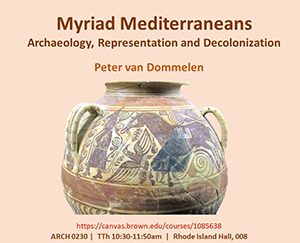 ARCH 0230 Myriad Mediterraneans: Archaeology, Representation and Decolonization [CRN: 17632] [Course Website]
ARCH 0230 Myriad Mediterraneans: Archaeology, Representation and Decolonization [CRN: 17632] [Course Website]
As debates rage about the Classical roots of Western society, the ancient Mediterranean itself is largely overlooked and continues to be seen in stereotypes. Because the ancient Mediterranean was not just white, male and colonizing, this course will explore the extensive archaeological evidence for cultural, gender, ethnic, economic and other forms of diversity during the first millennium BCE. Can archaeology contribute to current debates about decolonization? Conversely, can contemporary debates about indigenous ways of being shine a fresh light on ancient evidence? FYS. Instructor: Peter van Dommelen. TTh 10:30-11:50am.
A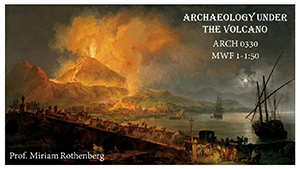 RCH 0330 Archaeology Under the Volcano [CRN: 18244] [Course Website]
RCH 0330 Archaeology Under the Volcano [CRN: 18244] [Course Website]
Disasters, lava, explosions! Communities from around the world throughout the history of our species have had to contend with the hazards, risks, and benefits of living in the shadow of active volcanoes. This class will take you on a tour of some of the most exciting and archaeologically important examples of human-volcano interactions from around the world – including Pompeii, of course! Students will be introduced to the anthropological, archaeological, and scientific methods that have been utilized to study human-volcano interactions, beyond just doomsday scenarios. Instructor: Miriam Rothenberg. MWF 1pm-1:50pm.
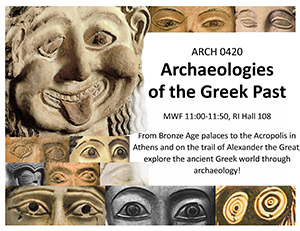 ARCH 0420 Archaeologies of the Greek Past [CRN: 18042] [Course Website]
ARCH 0420 Archaeologies of the Greek Past [CRN: 18042] [Course Website]
From Bronze Age palaces to the Acropolis in Athens and on the trail of Alexander the Great, this course explores the ancient Greek world through archaeology—using art, architecture, and everyday objects to learn about ancient Greek society, from the mysterious to the mundane. It also considers how we experience ancient Greece today, including questions about archaeological practice, the antiquities trade, and cultural heritage. WRIT. Instructor: Cicek Beeby. MWF 11am-11:50am.
ANTH 0500 Past Forward: Discovering Anthropological Archaeology [CRN: 16480]
Interested students can register for either ARCH 0100 or ANTH 0500.
This course offers a broad journey through the human past, from material culture crafted by our evolutionary ancestors to the remnants of the recent historic past. To facilitate this journey, the class explores the methods, concepts, and theories that anthropologists employ in the study of past peoples, places, and things. Case studies stretch across the globe. As a hands-on endeavor, archaeology focuses on tangible evidence. In this course, small-group discussion, laboratory, and field exercises will complement lectures, leading to an understanding of how anthropologists study the past and how that knowledge affects the present. LILE. Instructors: Parker Van Valkenburgh and Laurel Bestock. MWF 12pm-12:50pm.
ARCH 0683 From Fire Wielders to Empire Builders: Human Impact on the Global Environment before 1492 (HIST 0270A) [CRN: 16155]
Interested students must register for HIST 0270A.
This is a new lecture course intended to introduce the field of environmental history to students with no previous experience in it. The study of prehistoric, ancient and medieval environments is a heavily interdisciplinary research field, and the course will emphasize the variety of sources available for studying it. We will combine textbook readings with primary source readings from scientific and archaeological reports and, especially, contemporary texts. Instructor: Brian Lander. MWF 12pm-12:50pm.
ARCH 0717 Architecture of the House Through Space and Time (HIAA 0081) [CRN: 15884]
Interested students must register for HIAA 0081.
This undergraduate lecture course focuses on one building type, the house, through time in Mesopotamia, China, Japan, the Islamic world, the African diaspora, India, Britain, Rhode Island, and Germany and France. Houses can be minute or monumental, vernacular or high art, provide minimal shelter or afford the material and psychic satisfaction of home. By studying houses, we can bypass some of architectural history’s biases, and explore some of the major debates in the discipline: What is architecture? Who determines what is included/excluded in this category? And on what basis do they make these claims? WRIT A. Instructor: Itohan Osayimwese. TTh 1pm-2:20pm.
For Undergraduates and Graduates
ARCH 1051 Archaeology of Settler Colonialism (ANTH 1622) [CRN: 17067]
Interested students must register for ANTH 1622.
The course uses settler colonialism as a framework for understanding how European colonists attempted to displace and eliminate Indigenous peoples beginning in the 15th century and its historical implications for structural inequalities of race and gender. We will look at how settler colonialism is different from colonialism, and more importantly, at resistances challenging its ambitions. Case studies from North America mostly, but also Australia, South Africa, and other settler colonial societies will focus on historical archaeology’s contributions to illuminating settler colonialist strategies for establishing and maintaining settler sovereignty in light of concerns for decolonizing archaeological practices. We will give special attention to the insights gained about the experiences of dispossessed, enslaved, and marginalized peoples and their descendants, and the many ways their actions critiqued settler colonialism and imagined different futures. Instructor: Patricia Rubertone. TTh 10:30am-11:50am.
ARCH 1108 Politics and Spectacle in the Arts of Ancient Rome (HIAA 1307) [CRN: 16664]
Interested students must register for HIAA 1307.
This seminar investigates the intersection of politics and spectacles in the artistic production of ancient Rome. We will explore a variety of public monuments to reveal how they codify essential aspects of Roman culture. Topics include the architecture of entertainment spaces such as theaters, amphitheaters, and circuses, as well as the social functions of spectacles such as gladiatorial games and triumphal processions. We will look at expressions of imperial propaganda in monuments such as tombs and honorific arches. The class also considers how these ideas entered the private realm in the form of domestic wall paintings, mosaics, and sculpture gardens. A. Instructor: Gretel Rodriguez. M 3pm-5:30pm.
ARCH 1128 The Long Fall of the Roman Empire (HIST 1205) [CRN: 16119]
Interested students must register for HIST 1205.
Once thought of as the "Dark Ages," this period of western European history should instead be seen as a fascinating time in which late Roman culture fused with that of the Germanic tribes, a mixture tempered by a new religion, Christianity. Issues of particular concern include the symbolic construction of political authority, the role of religion, the nature of social loyalties, and gender roles. Instructor: Jonathan Conant. TTh 1pm-2:20pm.
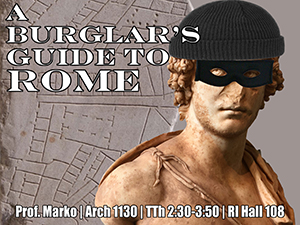 ARCH 1130 A Burglar's Guide to Rome [CRN: 17343] [Course Website]
ARCH 1130 A Burglar's Guide to Rome [CRN: 17343] [Course Website]
The Roman city, epitome of order or a burglar’s delight? On the surface we see grid-planned cities with demarcated city centers governed by endless rules: who was allowed in a space, what time one could use the baths, drive down main streets, and on and on. What if we take a different view? This course explores Roman cities through the eyes of those who broke the rules and lived off the grid. From sneaking in to steal a trinket to sacking an entire city, the burglars of the ancient world show how cities functioned and where they broke down. Instructor: Alex Marko. TTh 2:30pm-3:50pm.
ARCH 1162 Anthropology in/of the Museum (ANTH 1901) [CRN: 16197]
Interested students must register for ANTH 1901.
This course will provide an introduction to the history, purposes, transformations, and internal workings of museums from an anthropological perspective. Students will learn about museums that focus on natural and cultural history related to anthropological studies of archaeology, human evolution, and world ethnography. It will cover the relevance of anthropological training to careers in the museum field, as well as the importance of conducting anthropological investigations in the museum environment. Enrollment limited to 20. Instructor: Robert Preucel. F 3pm-5:30pm.
ARCH 1238 Classic Mayan Civilization (ANTH 1031) [CRN: 16192]
Interested students must register for ANTH 1031.
Examines the history, culture, and society of the Classic Maya, with special emphasis on Preclassic precursors, dynasties, environmental adaptation, imagery, architecture, urban form, and the Maya Collapse. Instructor: Stephen Houston. TTh 2:30pm-3:50pm.
ARCH 1234 Lost Languages (ANTH 1820) [CRN: 16196]
Interested students must register for ANTH 1820.
Humans make many marks, but it is writing that records, in tangible form, the sounds and meanings of language. Creating scripts is momentous; writing facilitates complex society and is a crucial means of cultural expression. This course addresses the nature of writing in past times. Topics include: the technology of script; its precursors and parallel notations; its emergence, use, and "death"; its change over time, especially in moments of cultural contact and colonialism; writing as a physical object or thing; code-breaking and decipherment, including scripts not yet deciphered; and the nature of non-writing or pseudo- or crypto-scripts. Instructors: Felipe Rojas and Stephen Houston. TTh 1pm-2:20pm.
ARCH 1544 Heritage in the Metropolis: Remembering and Preserving the Urban Past (URBN 1280) [CRN: 18243]
Interested students must register for URBN 1280.
Urban heritage – from archaeological sites and historic architecture to longstanding cultural practices – is increasingly threatened by the exponential growth of cities around the globe. Most critically, the complex histories and lived experiences of the diverse communities who have inhabited and shaped cities are often in danger of being erased and forgotten today. This course examines how we might remember and preserve this urban past – and the tangible sites and artifacts that attest to it – in light of the social and political dynamics of cities in the present. Instructor: Lauren Yapp. MWF 11-11:50am.
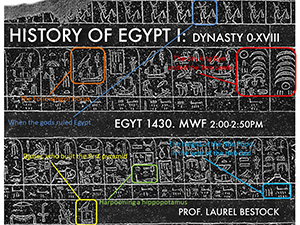 ARCH 1621 History of Egypt I (EGYT 1430) [CRN: 15843]
ARCH 1621 History of Egypt I (EGYT 1430) [CRN: 15843]
Interested students must register for EGYT 1430.
A survey of the history and society of ancient Egypt from prehistoric times to the end of the Eighteenth Dynasty (ca. 5000-1300 BC). Readings include translations from the original documents that serve as primary sources for the reconstruction of ancient Egyptian history. WRIT. Instructor: Laurel Bestock. MWF 2pm-2:50pm.
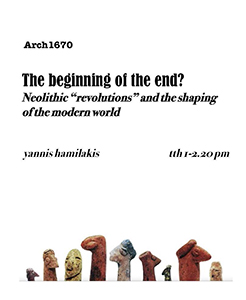 ARCH 1670 The Beginning of the End? Neolithic "Revolutions" and the Shaping of the Modern World [CRN: 18245] [Course Website]
ARCH 1670 The Beginning of the End? Neolithic "Revolutions" and the Shaping of the Modern World [CRN: 18245] [Course Website]
How did the first farmers and settled human communities live their lives? How did they reshape the landscape, invent new forms of elaborate dwelling, and establish new relationships with plants and animals? And are the roots of some of our contemporary problems, including social inequality and patriarchy, to be found in the Neolithic? These are some of the questions we will be exploring in this course, using material from the European and Anatolian Neolithic and other, global, contexts. Instructor: Yannis Hamilakis. TTh 1pm-2:20pm.
A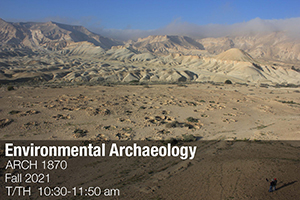 RCH 1870 Environmental Archaeology [CRN: 17911] [Course Website]
RCH 1870 Environmental Archaeology [CRN: 17911] [Course Website]
How has climate change affected the development of human society? How have people changed or destroyed their environments in the past? What does "sustainability" mean over the long term? Environmental archaeology is the study of these questions and more through the use of scientific techniques to analyze soils, plants, and animal remains from ancient archaeological contexts. A combination of class and hands-on teaching will introduce these methods and how they allow us to interpret human-environmental interactions in the past. Instructor: Zachary Dunseth. TTh 10:30am-11:50am.
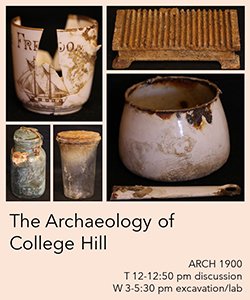 ARCH 1900 The Archaeology of College Hill [CRN: 15953] [Course Website]
ARCH 1900 The Archaeology of College Hill [CRN: 15953] [Course Website]
A training class in field and laboratory techniques. Topics include the nature of field archaeology, excavation and survey methodologies, archaeological ethics, computer technologies (such as GIS), and site and artifact analysis and conservation. Students will act as practicing archaeologists through the investigation of local historical and archaeological sites in the College Hill area (e.g. the First Baptist Church of America and the John Brown House). Instructor: Anna Soifer. W 3pm-5:30pm.
Primarily for Graduates
ARCH 2114 Archaeologies of Texts (ASYR 2800) [CRN: 16237]
Interested students must register for ASYR 2800.
An interdisciplinary seminar that examines the interplay between ancient texts and archaeology in the study of the ancient world. The emphasis will be on articulating the research methods and assumptions distilled from case studies set in the ancient Near East, Mediterranean, East Asia, and the Americas. Topics will include: canons of literature as/versus ancient inscriptions; materiality of text; texts on display, in deposits, in archives, in libraries, as refuse; literacy and education; practices of documentation and analysis; writing, language, and 'ethnicity'; historical geography; fakes and forgeries; ancient texts and archaeological ethics. No prerequisites. Intended primarily for graduate students. Instructor: Matthew Rutz. F 3pm-5:30pm.
ARCH 2179 Frameworks of Antiquity: Disciplines, Discourses, Politics (HMAN 2401G) [CRN: 16344]
Interested students must register for HMAN 2401G.
At least since decolonization, the study of antiquity has been a battleground for conflicting projects (imperial, colonial, national, indigenous, religious, feminist and queer, etc.). This seminar explores disciplinary formations that have supplied rival groups with cognitive maps, narratives of identity formation and transformation, and assets for real and symbolic capital. We will explore key disciplinary sites of debate—in archaeology, philology, philosophy, Scriptural and Classical studies, and history—concerning the distribution of groups (of people, languages, races), the establishment of spatial and temporal boundaries, and the limits of what can be argued, shown, possessed, and claimed to be true. Instructor: Tamara Chin. M 3pm-5:30pm.
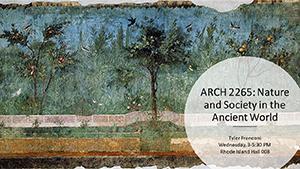 ARCH 2265 Nature and Society in the Ancient World [CRN: 18082] [Course Website]
ARCH 2265 Nature and Society in the Ancient World [CRN: 18082] [Course Website]
What is ‘nature’? Is human society separate and distinct from the ‘natural’ world, or a closely-entwined part? Historical investigations often simplify this relationship to one-sided explanations of social or environmental determinism, missing the lived reality of people in their landscapes. This class explores the ecological reality of the ‘natural’ world in Antiquity, using archaeological, historical, and palaeo-environmental data to investigate these questions, focusing especially on the Roman and late-Roman periods. Instructor: Tyler Franconi. W 3pm-5:30pm.
ARCH 2414 Race and Architecture (HIAA 2880) [CRN: 16799]
Interested students must register for HIAA 2880.
This graduate seminar will explore race--- a concept of human difference that established hierarchies of power and domination between Europe and Europe's 'others--and architecture from its earliest appearance to the present. Architecture has long reinforced the hierarchies embedded in western epistemology and present narrow visions of the world, reproducing cultural assumptions about space, place, city, comfort, etc., while assimilating race without acknowledging its impact. For its part, architectural history has largely uncritically conveyed the culture, norms, and values of architecture. Instructor: Itohan Osayimwese. M 3pm-5:30pm.
ARCH 2553 Introduction to Public Humanities (PHUM 2010) [CRN: 16988]
Interested students must register for PHUM 2010.
This class, a foundational course for the MA in Public Humanities with preference given to American Studies graduate students, will address the theoretical bases of the public humanities, including topics of history and memory, museums and memorials, the roles of expertise and experience, community cultural development, and material culture. Enrollment limited to 20 graduate students. Instructor: Marisa Brown. W 3pm-5:30pm.
ARCH 2559 Finding the Viewer: The Reception of Ancient Art and Architecture (HIAA 2301) [CRN: 17945]
Interested students must register for HIAA 2301.
This graduate seminar will explore the role of viewers in the creation of meanings for ancient art and architecture. We will be looking at a wide variety of artistic forms including architecture, sculpture, wall painting, and mosaics, asking, who were the viewers who encountered these works in ancient settings and how did they respond to their messages? In order to contextualize our case studies, we will engage with primary sources, archaeological data, and theories of ancient viewership and reception. A. Instructor: Gretel Rodriguez. F 3pm-5:30pm.
ARCH 2851 Skills Training in Material Culture Studies I [CRN: 17812]
When dealing with material culture, one must possess a solid foundation in a range of skills. How does one document and analyze artifacts, architecture and landscapes, what techniques are appropriate in what cases? How should all this information be securely stored and promulgated? This "hands on" class, intended for students in multiple disciplines, will consider the study of particular types of material or bodies of evidence (e.g., pottery, lithics, epigraphy, numismatics). F 3pm-5:30pm.
Summer 2021
(Jump to Fall 2021 or Spring 2022)
Primarily for Undergraduates
ARCH 0150 Introduction to Egyptian Archaeology and Art [CRN 60045]
An introductory survey of the archaeology, art and architecture of ancient Egypt, ranging in time from the prehistoric cultures of the Nile Valley through the period of Roman control. While the course will examine famous features and characters of ancient Egypt (pyramids, mummies, King Tut!), it will also provide a wide-ranging review of the archaeology of this remarkable land. Instructor: Laurel Bestock. MWF 11am-11:50am. Online.
ARCH 0353 Thunder-gods and Dragon-slayers: Mythology + Cultural Contact - Ancient Mediterranean and Near East (ASYR 0310) [CRN 60246]
Interested students must register for ASYR 0310.
This course is an exploration of the mythological imagination in the ancient Mediterranean and Near East. From cosmic origins to epic battles, mighty queens to baneful monsters, mythological motives and narratives crisscrossed the ancient world, bypassing seemingly rigid geographic and cultural boundaries. Particular attention will be devoted to the study of the dynamic reinterpretation of myths in situations of cultural contact. Primary evidence will include material from Mesopotamia, Egypt, Anatolia, the Levant, Greece and Rome. The course will span several millennia, from the earliest attestations of the Epic of Gilgamesh to the Christian and Muslim reinterpretation of so-called pagan myths. FYS.Instructor: Felipe Rojas. TTh 10:30am-11:50am.
ARCH 0424 Greek Mythology (CLAS 0900) [CRN 60054]
Interested students must register for CLAS 0900.
“What of these things goes now without disaster?” -Aeschylus, Agamemnon
This course is an introduction to Ancient Greek mythological traditions. Topics include: the Olympian gods; ‘culture heroes’ (e.g. Heracles), Homer and the Trojan Cycle of myths; mythical traditions about the families of Oedipus and Agamemnon; etc. We will conclude with an investigation of ancient mythical scholarship and skeptical views of myth in antiquity. Throughout we will be considering myth’s relationship with literature, visual culture, and religion. The class focuses on the ancient material (texts, images, monuments, rituals and traditions, etc.), with some secondary readings in mythological and cultural theory. Instructor: Johanna Hanink. Online.
ARCH 0428 War and Society: A Legacy of Ancient Greece? (CLAS 0650) [CRN 60089]
Interested students must register for CLAS 0650.
21st century society can no longer study the worlds of ancient Greece and Rome acritically. Today’s culture can be very accepting about the “culture of war” that was such a dominant aspect of the apogee of ancient Greek ‘civilization’: the 300 Spartans, the Athenian Empire, and the conquest of Persia, are all moments to which some turn in admiration. The exploitation of the martial culture today is a two-edged sword at least. This course explores the legacy of war, and violence, and its impact on our view of “civilization.” We will look at the key topics including Homer and warfare, Sparta, Persia, Athens’ Empire, Philip II and Alexander, violence in the Greek city, martial culture, exploitation, memory, and of course the 21st century legacy. Instructor: Graham Oliver. MWF 1pm-1:50pm.
ARCH 0679 The Ocean in Global History (HIST 0150J) [CRN 60345]
Interested students must register for HIST 0150J
This course plumbs the depths of the ocean's past to investigate how the planetary hydrosphere and its creatures have imprinted themselves upon the social, political, and cultural character of diverse human communities as sources of sustenance and power, cosmology and knowledge, conveyance and death. Topics to be considered include Austronesian seafaring traditions in the ancient Indo-Pacific; maritime empires, piracy and human trafficking in the age of sail; industrial fisheries and the establishment of oceanography as a scholarly discipline; and the political ecology of a warming ocean in the era of climate crisis. Instructor: Gabriel Rocha. MW 8:30am-9:50am Course offered online.
For Undergraduates and Graduates
ARCH 1168 Decolonization, History, Art, Museums and Curation (AFRI 1045) [CRN 60392]
Interested students must register for AFRI 1045
Over the past few years there have been calls for decolonization of art and museums. But what do these calls mean? There are now claims for reparations of art objects and in ethnographic museums human remains. The decolonization call has foregrounded the colonial origins of many of the world’s leading museums and called into question curatorial practices. It asks us to think about art and exhibition histories and the present narratives about the making of the modern museum. This course will examine these issues as well as attempts to reimagine museums. Issues of curatorial practices of historical and art exhibitions will be reviewed. Curators and artists from Africa, Europe and USA will deliver in class lectures and lead discussions. Undergraduate seminar. Graduate students are welcome. Instructor: Barrymore Bogues. W 3pm-5:30pm.
ARCH 1887 Illustrating Knowledge (HIAA 1101A) [CRN 60284]
Interested students must register for HIAA 1101A.
This seminar will investigate the history of illustration from the first manuscript maps and printed herbals to the present, including paintings, photographs, and computer imaging. We will investigate the role of pictures in the exchange of scientific ideas, and modes of representation developed in both the arts and the sciences. Enrollment limited to 19 first year students. Instructor: Evelyn Lincoln. W 3pm-5:30pm.
ARCH 1892 Books, Material and Digital (AMST 1906L) [CRN 60370]
Interested students must register for AMST 1906L.
This course considers books as material objects, cultural artifacts, and as information. We will make paper and print with the hand press, and read about skills and materiality, to understand books as objects. Descriptive bibliography helps us understand books as cultural artifacts in libraries, and we will consider the cultures of collecting and cataloging and reading. Increasing, books are used in digital formats, depending on new kinds of technology and labor, and offering new and different kinds of access. How do libraries and scholars consider and take advantage of both materiality and digitality in their collection, preservation, and use of books? Instructor: Steven Lubar. TTh 10:30am-11:50am.
ARCH 1900 The Archaeology of College Hill [CRN 60046]
A training class in field and laboratory techniques. Topics include the nature of field archaeology, excavation and survey methodologies, archaeological ethics, computer technologies (such as GIS), and site and artifact analysis and conservation. Students will act as practicing archaeologists through the investigation of local historical and archaeological sites in the College Hill area (e.g. the First Baptist Church of America and the John Brown House). Instructor: Anna Soifer. W 3pm-5:30pm.
Additional Course Information
You may also visit Courses@Brown listings for up-to-date information on courses and room assignments. Check under: Area of Study: "Archaeology and the Ancient World”
For a listing of all courses ever taught in Archaeology and the Ancient World (or in Old World Archaeology, its predecessor), please visit the "All Courses" page on this website. To browse the web pages and Canvas sites -- including syllabi -- for most ARCH courses, please see our "Course Websites" page.
